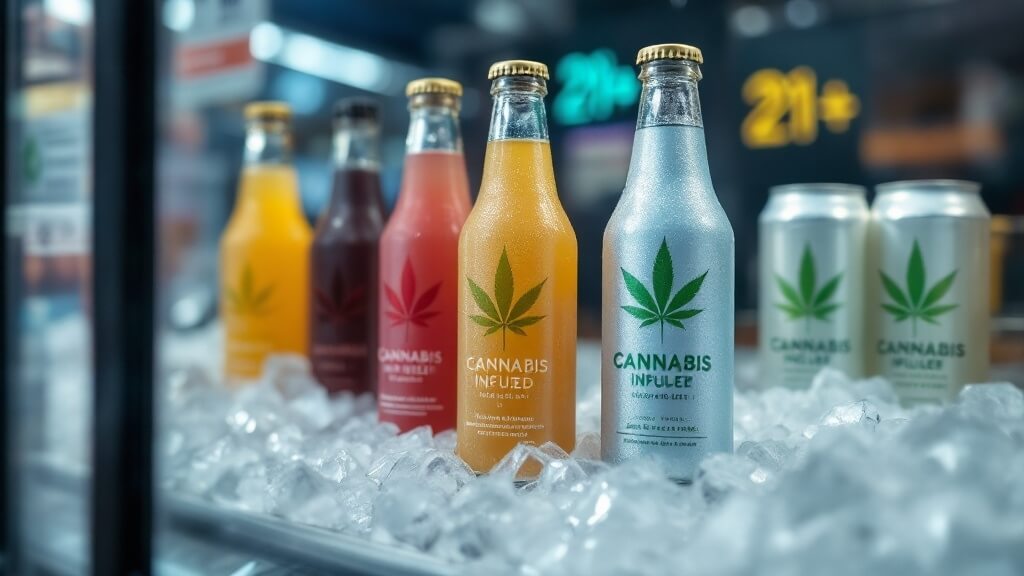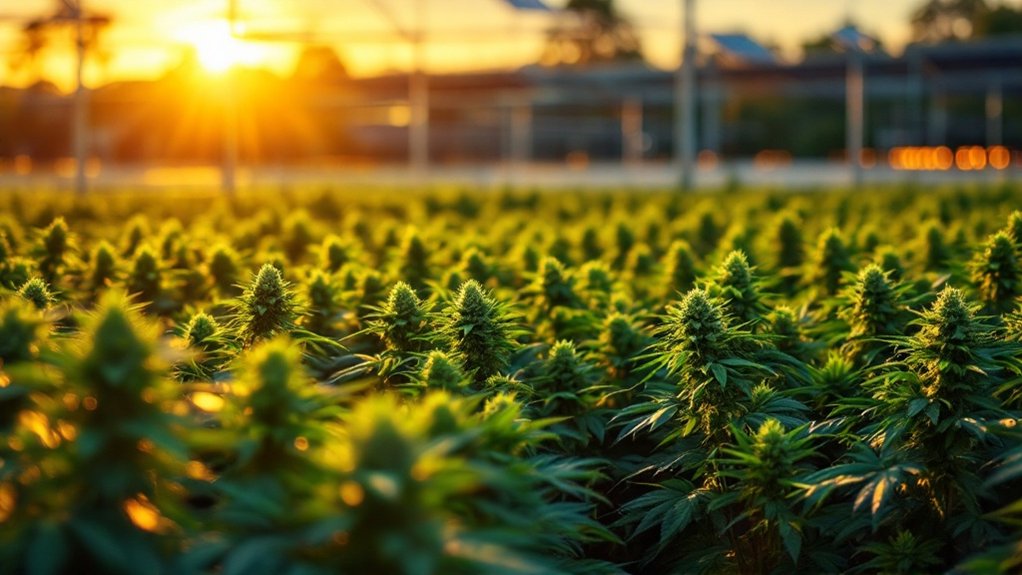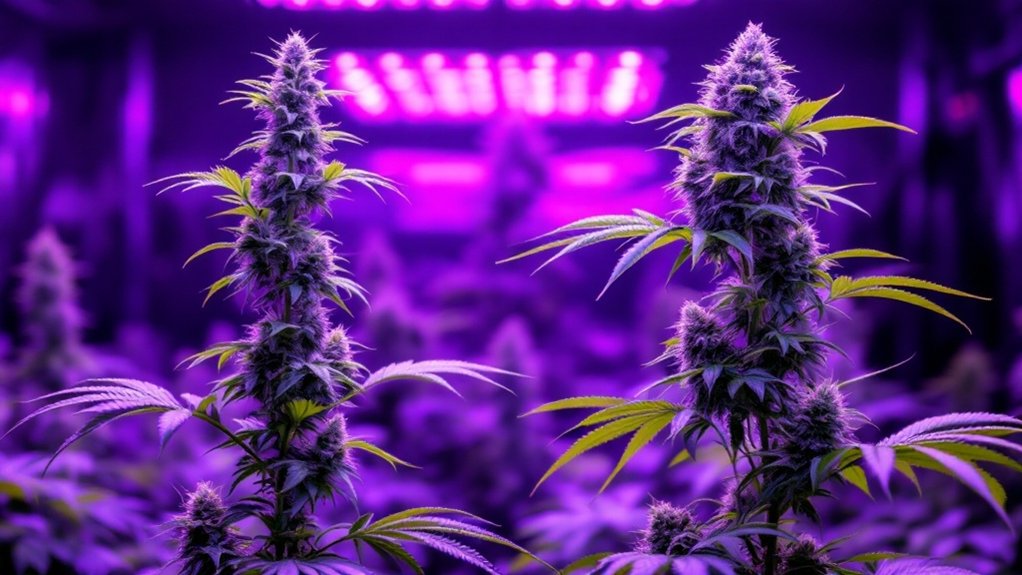THC beverages represent a rapidly expanding segment of the cannabis market, projected to reach up to $809 million by 2025 in the US alone. These products appeal primarily to adults aged 21-34 and women seeking stress relief and wellness benefits. The diverse offerings include sodas, teas, and non-alcoholic spirits with varying THC and CBD concentrations for precise dosing. This growing trend coincides with increased “sober curiosity” and evolving cannabis legislation across North America.

Nearly one in five American adults expresses interest in trying THC-infused beverages, signaling the emergence of a significant new segment in the cannabis market. This 18% of adults aware of cannabis drinks represents substantial potential for growth in an industry already gaining momentum. Market projections vary considerably, with estimates ranging from $251.7 million to over $809 million by 2025, demonstrating the evolving nature of forecasts for this nascent industry.
The burgeoning THC beverage market captures 18% of American adults’ interest, with projected values reaching up to $809 million by 2025.
The global cannabis beverage market is experiencing remarkable expansion, expected to reach $2.8 billion by 2025 with a compound annual growth rate of 17.8%. Recent data shows U.S. cannabis beverage sales totaled $54 million from mid-2023 to mid-2024. Cannabis beverages grew 11% during 2024, continuing the product category’s upward trajectory in the market. Industry experts anticipate continued growth through 2030, with projections suggesting the market will reach $1.36 billion, maintaining a CAGR of nearly 11%.
Consumer demographics reveal interesting patterns in adoption rates. Women and adults aged 21-34 demonstrate the highest likelihood of consuming THC-infused beverages. Surprisingly, parents of young children aged 3-5 years show elevated interest in these products. Research indicates many frequent consumers of cannabis beverages express curiosity about sobriety, reflecting broader wellness trends in the marketplace. Consumers typically pursue these beverages for stress relief, wellness benefits, and as alternatives to alcoholic drinks amid growing “sober curiosity” trends.
THC beverages encompass a diverse range of products, including sodas, teas, juices, and non-alcoholic versions of traditional spirits. Manufacturers formulate products with varying THC and CBD concentrations to produce different effects, from mild relaxation to more pronounced psychoactive experiences. The industry emphasizes precise dosing and consistent effects to build consumer confidence and satisfy regulatory requirements.
North America dominates the global market share, with the United States and Canada leading consumption due to progressive legalization policies. Regional preferences influence product development strategies as companies adapt to local tastes and regulations. International markets show growth potential as cannabis laws evolve in parts of Europe and Asia-Pacific.
Major companies like Aurora Cannabis, Aphria, Canopy Growth Corporation, and MedReleaf Corp. have established significant presence in the market. These entities increasingly partner with established beverage brands to expand distribution channels and market reach.
The competitive landscape continues intensifying with startups introducing innovative formulations and established companies leveraging their production capacity and distribution networks. Despite regulatory challenges, the THC beverage market presents substantial opportunities for growth as consumer education advances and stigmatization decreases.
Frequently Asked Questions
How Long Do Effects From THC Beverages Typically Last?
THC beverages typically produce effects lasting 4-6 hours, though this duration varies based on several factors.
Some nanoemulsified products may deliver shorter experiences of only 60-90 minutes, while others can extend to 12 hours depending on dosage, metabolism, and body weight.
Effects generally begin within 10-15 minutes after consumption, reaching peak intensity around 45-60 minutes later.
This duration falls between the shorter effects of smoking (1-3 hours) and the longer experiences of traditional edibles.
Are THC Drinks Legal to Transport Across State Lines?
Interstate transport of THC beverages depends on THC content and source.
Hemp-derived products containing less than 0.3% Delta-9 THC by dry weight are federally legal to ship across state lines.
However, beverages with higher THC concentrations derived from cannabis cannot legally cross state borders, even between two states where they’re locally legal.
State regulations vary considerably, creating a complex patchwork of rules that businesses must navigate when shipping THC-infused drinks.
Can THC Beverages Be Detected in Standard Drug Tests?
THC beverages can indeed be detected in standard drug tests.
These tests primarily identify THC-COOH, a metabolite that forms after cannabis consumption.
Detection windows vary considerably by test type: urine tests can show positive results for 1-30 days, saliva tests for up to 72 hours, hair tests for up to 90 days, and blood tests for a few hours to several days.
Factors affecting detection time include frequency of use, metabolism rate, and THC concentration in the beverage.
Do THC Drinks Interact With Prescription Medications?
THC drinks can interact with numerous prescription medications through several mechanisms.
THC and CBD components inhibit cytochrome P450 enzymes and glycoprotein P transporters, potentially altering the metabolism of approximately 400 medications.
These interactions may increase blood concentrations of certain drugs, particularly affecting CNS depressants, anticoagulants, immunosuppressants, and pain medications.
The resulting effects can include enhanced sedation, increased bleeding risk, toxic adverse events, and impaired cognitive function when THC beverages are consumed alongside prescription medications.
What’s the Shelf Life of Unopened THC Beverages?
Unopened THC beverages typically maintain their potency and quality for 1-2 years from the manufacturing date.
Most THC-infused sodas containing preservatives remain effective for approximately 12 months, while properly stored cannabis drinks generally last 8-12 months.
Shelf life depends considerably on storage conditions, with cool, dark environments substantially extending product viability.
Packaging materials also influence longevity; glass and airtight containers better protect against degradation factors like light, heat, and air exposure that gradually diminish cannabinoid potency.









